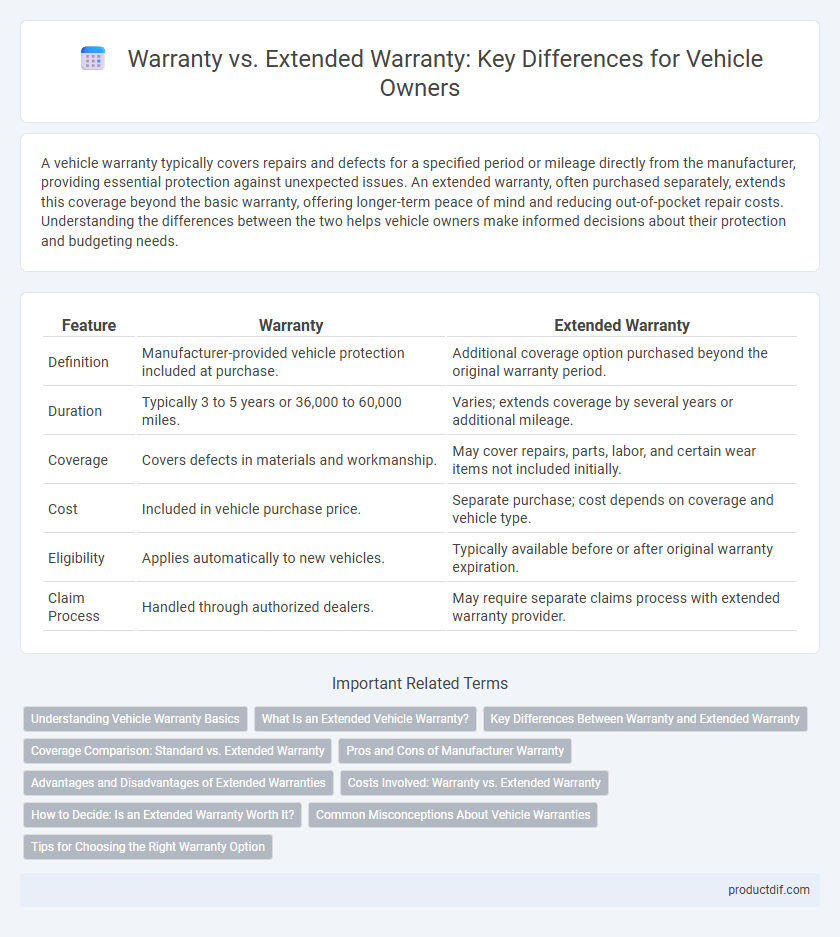A vehicle warranty typically covers repairs and defects for a specified period or mileage directly from the manufacturer, providing essential protection against unexpected issues. An extended warranty, often purchased separately, extends this coverage beyond the basic warranty, offering longer-term peace of mind and reducing out-of-pocket repair costs. Understanding the differences between the two helps vehicle owners make informed decisions about their protection and budgeting needs.
Table of Comparison
| Feature | Warranty | Extended Warranty |
|---|---|---|
| Definition | Manufacturer-provided vehicle protection included at purchase. | Additional coverage option purchased beyond the original warranty period. |
| Duration | Typically 3 to 5 years or 36,000 to 60,000 miles. | Varies; extends coverage by several years or additional mileage. |
| Coverage | Covers defects in materials and workmanship. | May cover repairs, parts, labor, and certain wear items not included initially. |
| Cost | Included in vehicle purchase price. | Separate purchase; cost depends on coverage and vehicle type. |
| Eligibility | Applies automatically to new vehicles. | Typically available before or after original warranty expiration. |
| Claim Process | Handled through authorized dealers. | May require separate claims process with extended warranty provider. |
Understanding Vehicle Warranty Basics
Vehicle warranties typically cover defects in materials or workmanship for a specific period or mileage, providing essential protection against unexpected repair costs. Standard warranties often include powertrain and bumper-to-bumper coverage, while extended warranties expand this protection beyond the factory terms, often including additional components and services. Understanding the limitations, coverage details, and costs of both warranties is crucial for making informed decisions about vehicle protection.
What Is an Extended Vehicle Warranty?
An extended vehicle warranty is a service contract that provides coverage for repairs and maintenance beyond the original manufacturer's warranty period, offering protection against unexpected mechanical failures. Unlike the standard warranty, which is included with the purchase of a new vehicle and typically lasts 3 to 5 years or a specific mileage limit, an extended warranty can be purchased separately and tailored to cover additional years or higher mileage. This coverage often includes major components such as the engine, transmission, and electrical systems, reducing out-of-pocket repair costs for vehicle owners.
Key Differences Between Warranty and Extended Warranty
A standard vehicle warranty typically covers repairs and defects for a specific duration or mileage, such as 3 years or 36,000 miles, providing basic protection from manufacturer defects. An extended warranty extends this coverage beyond the original warranty period, often offering additional services like roadside assistance, and can be purchased separately or through the dealer. Key differences include coverage length, cost, and the scope of services, with extended warranties often covering wear-and-tear items excluded from the original warranty.
Coverage Comparison: Standard vs. Extended Warranty
Standard vehicle warranties typically cover essential components like the engine, transmission, and drivetrain for a limited period or mileage, usually 3 years or 36,000 miles. Extended warranties provide broader protection, often including additional parts such as electrical systems, air conditioning, and roadside assistance, extending coverage beyond the standard warranty's expiration. Choosing an extended warranty can offer peace of mind with prolonged coverage and reduced out-of-pocket repair expenses for unexpected vehicle issues.
Pros and Cons of Manufacturer Warranty
Manufacturer warranty offers comprehensive coverage for vehicle repairs and defects during the initial ownership period, typically lasting three to five years or a set mileage, providing peace of mind and reducing unexpected repair costs. Limitations include coverage constraints on wear-and-tear parts and exclusion of damages from accidents or misuse, which may result in out-of-pocket expenses for certain repairs. The warranty's transferability and included roadside assistance add value, but vehicle owners must adhere to maintenance schedules and authorized service centers to avoid voiding the warranty.
Advantages and Disadvantages of Extended Warranties
Extended warranties offer prolonged protection beyond the manufacturer's warranty, covering repairs and maintenance that reduce unexpected out-of-pocket expenses. However, the cost of extended warranties can be high, and some plans may exclude certain repairs or have strict claim limitations. Evaluating the vehicle's reliability and potential repair costs helps determine if the extended warranty provides value.
Costs Involved: Warranty vs. Extended Warranty
Standard vehicle warranty typically covers repair costs for a specific period or mileage, usually at no additional cost beyond the purchase price. Extended warranty involves an extra fee, offering prolonged coverage and potentially reducing out-of-pocket expenses for repairs after the original warranty expires. Consumers must weigh the upfront extended warranty cost against potential future repair expenses to determine overall savings.
How to Decide: Is an Extended Warranty Worth It?
Evaluating whether an extended vehicle warranty is worth it depends on factors like the car's reliability, existing manufacturer coverage, and potential repair costs. Newer vehicles with strong warranties may not need extra coverage, while older or high-mileage cars could benefit from extended protection to avoid expensive repairs. Reviewing the warranty's terms, coverage limits, and cost-effectiveness compared to anticipated repair expenses helps make an informed decision.
Common Misconceptions About Vehicle Warranties
Vehicle warranties often lead to confusion, particularly between standard manufacturer warranties and extended warranties, which are separate contracts covering repairs beyond the original coverage period. Many consumers mistakenly believe extended warranties are included automatically or that they cover all types of repairs, but these plans usually require additional purchase and have specific limitations. Understanding the distinction and terms of each warranty type is crucial for avoiding unexpected repair costs and ensuring proper coverage.
Tips for Choosing the Right Warranty Option
Evaluate the manufacturer's warranty coverage duration and what it includes when comparing it to extended warranty plans for vehicles. Consider the vehicle's age, mileage, and your driving habits to determine if an extended warranty offers valuable protection beyond the original terms. Research the reputation and customer service of warranty providers to ensure reliable claims handling and cost-effectiveness in the long term.
Warranty vs Extended Warranty Infographic

 productdif.com
productdif.com